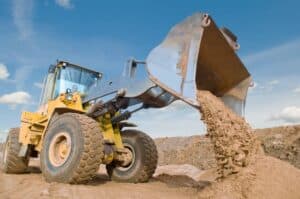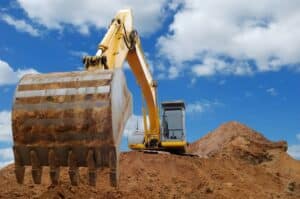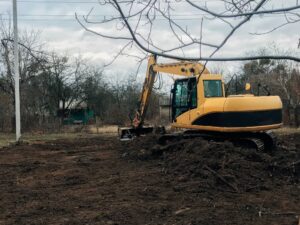
A lot of processes go behind the scenes before you can start building on a construction site. Excavation is one of the vital stages of the construction process and the very first step.
Excavation can be challenging, and it's a relatively inexpensive step in the process, but it's vitally important. But what is excavation, anyway? Is it the same as digging? What’s the difference between digging and excavation?
According to the dictionary, digging means breaking up and moving earth with a tool or machine or with hands, paws, snouts, etc. Meanwhile, excavating means the act of removing materials like, but not limited to, earth, clay, soil, ground, stone, rocks, and sand from the land for or which has the resultant effect of changing the existing contour of or lowering, or raising, the elevation of said land or any part thereof.

Simply put, excavation is a lot more than simply digging a hole.
Excavation means moving and removing soil and rock from a workplace to form an open hole, trench, tunnel, or cavity. The work can include drilling, trenching, and grading services.
Usually, this involves using heavy machinery like bulldozers, backhoes, excavators, and forward loaders. Excavation is critical for every construction project because it creates a strong foundation and provides a stable surface for the surrounding property.
In engineering and construction, excavation involves using tools, equipment, or explosives to move soil, rocks, or other materials. Excavation is undertaken for several purposes, and different types of excavation are classified by their specific purpose or the material being excavated. Below are thirteen common types of excavation, by both type and material.
This kind of excavation is linked to building bridges. It's about removing anything that could get in the way of making the base and parts needed to hold up the bridge.
In many types of excavation, materials are removed to make way for construction. Borrow excavation does just the opposite. In this type of excavation, materials like soil or gravel are taken from a "borrowed" pit (sometimes called a sandbox) to be used in another location. These materials may be used for grading, filling, or mixing with construction materials like concrete.
Channel excavation consists of removing materials from channels, drainage ditches, and so on for several purposes, but often to change the water flow or increase capacity. This could help to alleviate flooding or, alternately, stagnation and sediment buildup.
Drainage is related to carrying water away from areas. It could include ditches, trenches, storm drains, agricultural drainage, drainage for runoff, and so on, and any structures related to such drainage. These ditches must be excavated to funnel water away from habitation, infrastructure, agriculture, and other areas that could be harmed.

Sediment deposits in waterways can build up over time, making them impassable. Dredging is an excavation that takes place underwater, generally in rivers or shallow ocean passages (or other waterways), to remove sediment to other locations so that boat traffic can navigate without getting stuck.
This type of excavation classification centers on the material being excavated rather than the purpose for excavation. As you can guess, it pertains to the removal of soil (located beneath topsoil), and it could apply to earth removal to lay a structure foundation, digging a drainage ditch, or any other construction or engineering project.
Footings are foundation structures that support buildings, bridges, and other structures by spreading the load so that the heavy structure above doesn't sink or collapse. Footing excavation occurs after a building site has been properly graded, at which point excavation can begin. This type of excavation may be more precise than other types, as the concrete for footings will likely be poured and left to set.
Like earth excavation, this type is based on material, such as muck or a combination of water and soil. Specifically, muck includes undesirable water and soil, perhaps due to contamination or the water content, making an area impassable. Excavation can be employed to remove muck to another area or spread it out for the soil to dry.
Excavation related to roadways can have a couple of different purposes. For example, excavated materials may be removed to another location to make way for road construction. However, excavated materials such as dams may also be used to build the roadway. Occasionally, unsuitable slope materials will be excavated and removed, and other excavated materials will be brought in to replace them.
Rocks excavation happens when we must clear them out for building or engineering work. This can be tougher than other digging and might need special tools to break and clear the rocks before we can start the project.

Stripping is an excavation that revolves more around clearing a large area than digging a pit or a trench. Before construction or engineering projects can begin, an area may need to be cleared of topsoil, gravel, sand, rocks, and so on, and grading might need to be done. In such cases, excavation will consist of clearing away wide, shallow swaths of material.
This often needs to be clarified with stripping because stripping is the method of excavation used to remove topsoil. However, this type of excavation is specific to the material, topsoil, consisting of vegetation and the uppermost soil level.
Excavations of this type occur underground rather than above ground, meaning that different tools, equipment, and techniques may be required to remove materials safely and effectively. In many cases, vertical or diagonal shafts and horizontal tunnels are excavated to build roadways, subways, canals, sewage, or other underground passages, as well as for other purposes.
Here are seven instances where excavation construction is necessary
Whenever you plan to build something new, going for excavation is a wise decision. Opting for excavation services is among the best methods to ensure a sturdy base for your building. A solid foundation guarantees a long-lasting structure with no concerns over the years.
For a better grip, the foundation of a construction unit should be placed on firm ground. Once positioned on an excavated foundation, the structure should endure various disruptions. As extreme weather events like typhoons and floods become more frequent, it's crucial to construct buildings that can handle these situations.
The water system is one of the most costly and challenging elements of building anything. Do you have a little fix to do in your home's plumbing? It might set you back a lot. Ensuring your water system works well matters when putting up something new.
The simpler it is to get to your system for fixes, the less it costs to keep up. When you've got a big problem and need to replace or fix parts of your system, digging helps you upgrade.
Consider excavation construction if you're dealing with a site covered with waste or requiring much material removal. It ensures you can dig up and remove any contaminants or waste on your site. When hiring the right professionals, moving large objects or removing huge amounts of material is much easier.
As mentioned, people building new houses or businesses require these services for foundations. Having these experts helps you handle any land effectively. Instead of dealing with difficult materials alone, hiring professionals guarantee that the site becomes manageable.
Creating holes and ditches to excavate foundations holds significance. Employing experts offers more benefits, like maintaining good water flow and managing runoff on your fresh site.

Both residential and commercial builders deal with grading and landscaping of sites. Attempting to handle a location on a steep incline or extremely uneven ground necessitates effort to achieve balance. Opting for construction on a properly leveled site can provide greater safety.
Moving and placing pipes requires the right tools or skilled workers. Excavation construction experts make handling big pipes and intricate setups easier.
Setting up plumbing and sewer lines involves more than digging in that spot. It also means lifting and positioning the pipes.
When it's time to fix broken sections, the top choice is excavation construction experts. They can locate the area needing repair without extra harm or unnecessary digging.
When dealing with moving concrete slabs or large rocks, you must call people with the skills to perform the job. Excavation equipment can move materials faster. The better the construction company you call, the better they will be able to meet your needs.
They can take out snow during the winter so that you can build on an area all year round. As long as conditions allow you to work, no material is too massive to keep you from finishing a project.
For sites that require massive lots or roads connecting around a large residential or commercial site, there's no one better for your work than excavation specialists. They will be able to help you to grade, pave, and install the ideal solution.
Excavation contractors are the go-to professionals for installing highways. The type of clearing that goes into projects such as that means lots of equipment and strategic planning are necessary.
For almost any project, excavation construction is the best way to ensure you do the job properly. From your foundation to all repairs and maintenance, excavation construction will provide a site that can last without major problems for decades. Please contact us today!